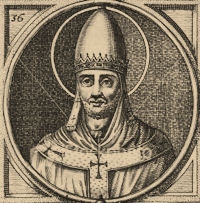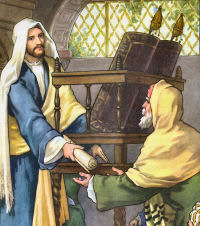Easter: April 12th
Saturday of the Third Week of Easter
Other Commemorations: Julius I, Pope (RM)
» Enjoy our Liturgical Seasons series of e-books!
After hearing his doctrine many of the followers of Jesus said, “This is intolerable language. How could anyone accept it?” Jesus was aware that his followers were complaining about it and said, “Does this upset you? What if you should see the Son of Man ascend to where he was before? It is the spirit that gives life, the flesh has nothing to offer. The words I have spoken to you are spirit and they are life (Jn 6:60-63).”
Why Did Christ Rise from the Dead?
The great minds of Christianity have written volumes in explanation of why Jesus Christ rose bodily from the grave.
The resurrection of Christ is the great vindication of divine justice, which elevates those who humble themselves. In the words of St. Thomas, "Since Christ humiliated Himself even to the death of the Cross out of love and obedience to God, He was therefore exalted by God even to His resurrection from the dead." It is this glorification of His risen humanity to which Christ refers in St. Ignatius' Spiritual Exercises when He says, "My will is to conquer the whole world and all my enemies, and thus to enter into the glory of my Father."
The resurrection of Christ is also the great proof of His divinity and in that sense the keystone of our faith. During His mortal life Christ had often professed Himself to be God in human flesh. "The Father and I are one," He declared. In testimony of this claim He allowed Himself to be crucified, died, and by His own power arose from the dead; thus clearly manifesting that He was indeed the Resurrection and the Life, first in His own favor and then for all the rest of mankind. Without the divinity of Christ, confirmed by the miracle of Easter Sunday, the incarnation is a misnomer and the redemption a sham. "If Christ has not risen," says St. Paul, "vain then is our preaching." And vain all the mysteries of our faith.
Besides confirming our faith in His divinity, Christ's resurrection gives the hope of our own restoration from the grave. As the first fruits of those who sleep, the Head of the Mystical Body became a pledge of immortality to His faithful members on the last day. This is integral to the promise of Christ that those who follow Him in labor and suffering will also follow Him in glory. While only part of the reward, the glorification of our body after the example of Christ can be a powerful motive in the spiritual life. Since the control of bodily passions by "acting against sensuality and carnal desires" often demands a great deal of sacrifice, there should be a corresponding remuneration, not only for the soul but also for the body which shared in the earthly struggle. For the soul, this reward is the beatific vision, for the body, it is the resurrection which endows the sensible faculties with transcendent powers and inebriates them, in the words of revelation, with the torrent of God's pleasure.
Finally and most importantly the resurrection of Christ is the cause of our reinstatement in the friendship of God. As the result of Adam's fall we were twice removed from divine love, once by reason of original sin that infected our human nature and once again by the loss of sanctifying grace that gave us a title to the vision of God. Two kinds of life were to be restored, as there were two kinds of death from which we had to be redeemed, the one bodily and the other spiritual. As the passion of Christ removed both forms of death, so His resurrection restored both forms of life.
Excerpted from The Meaning of Easter by Fr. John A. Hardon, S.J.
St. Julius I
 With Pope St. Julius the Papacy finds at its doorstep the vexing problem of the Eastern Arians. It is true that the Council of Nicaea had condemned Arianism, but in spite of that Arians had been growing in strength and had even gained the ear of Constantine, and what was more crucial, that of his son Constantius who succeeded him in the East.
With Pope St. Julius the Papacy finds at its doorstep the vexing problem of the Eastern Arians. It is true that the Council of Nicaea had condemned Arianism, but in spite of that Arians had been growing in strength and had even gained the ear of Constantine, and what was more crucial, that of his son Constantius who succeeded him in the East.
The man who was compelled to face the problem was Julius, a Roman who had been chosen to succeed Mark after an unexplained interval of four months. He soon received delegates from Alexandria asking him to acknowledge a certain Pistus as bishop of Alexandria in place of Athanasius, the mighty fighter for orthodoxy. The delegates tried to prove that Athanasius, who actually had been the victim of Arian intrigue, had been validly deposed. Athanasius on his part also sent envoys and later came to Rome in person to plead his case before the Pope. The Arians asked Julius to hold a synod to decide the case, but when in 341 Julius actually did convene it, they refused to attend. The Pope held it without them and over fifty bishops decreed that Athanasius had been unjustly condemned. Julius informed the Arians at Alexandria of this decision and let them know that he was displeased at their uncooperative attitude.
The Emperor Constans, who ruled in the West, was favorable to the orthodox Christians while his brother Constantius, who ruled the East, was pro Arian. At this time both Emperors agreed to hold a big general council to see if religious unity could be achieved. Pope Julius approved of the plan and sent legates to Sardica, the modern Sofia, where the council gathered. The council did not achieve religious unity because the Arians, when they found themselves outnumbered, walked out. The council once again vindicated Athanasius and once more repeated the solemn Nicene Creed. It also left an interesting set of regulations on the manner in which appeals to the pope should be made.
In spite of the repeated vindications of Athanasius, that good man was unable to return to his see. Emperor Constans supported the Arian George until the usurper died. Then and only then was the long-suffering Athanasius allowed to go home. Pope Julius, delighted, wrote a letter to the people of Alexandria, congratulating them on the return of their true bishop.
At Rome the number of Christians continued to grow during the pontificate of Julius. He built two new basilicas and three cemetery churches. The stay of St. Athanasius at Rome helped to popularize Egyptian monasticism and gave an impetus to religious life there.
Pope St. Julius died April 12, 352. He was buried in the Cemetery of Calepodius. His feast is celebrated on April 12.
—Excerpted from Popes Through the Ages by Joseph Brusher
Highlights and Things to Do:
- Learn more about Pope St. Julius:






